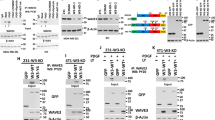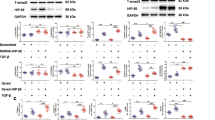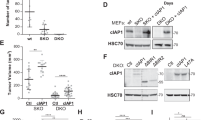Abstract
Transforming growth factor β (TGF-β) induces both apoptosis and cell-cycle arrest in some cell lines, but only growth arrest in others1. It is not clear how this differential response to TGF-β is specified. Smad proteins are critical mediators of TGF-β signalling. After stimulation by TGF-β, Smad2 and Smad3 become phosphorylated by the activated TGF-β receptor kinases, oligomerize with Smad4, translocate to the nucleus and regulate the expression of TGF-β target genes1,2,3,4,5. Here we report that the sensitivity to TGF-β-induced apoptosis is regulated by crosstalk between the Akt/PKB serine/threonine kinase and Smad3 through a mechanism that is independent of Akt kinase activity. Akt interacts directly with unphosphorylated Smad3 to sequester it outside the nucleus, preventing its phosphorylation and nuclear translocation. This results in inhibition of Smad3-mediated transcription and apoptosis. Furthermore, the ratio of Smad3 to Akt correlates with the sensitivity of cells to TGF-β-induced apoptosis. Alteration of this ratio changes the apoptotic, but not the growth-inhibitory, responses of cells to TGF-β. These findings identify an important determinant of sensitivity to TGF-β-induced apoptosis that involves crosstalk between the TGF-β and phosphatidylinositol-3-OH kinase (PI(3)K) pathways.
This is a preview of subscription content, access via your institution
Access options
Subscribe to this journal
Receive 12 print issues and online access
$209.00 per year
only $17.42 per issue
Buy this article
- Purchase on Springer Link
- Instant access to full article PDF
Prices may be subject to local taxes which are calculated during checkout




Similar content being viewed by others
References
Massague, J. TGF-β signal transduction. Annu. Rev. Biochem. 67, 753–791 (1998).
Moustakas, A. & Heldin, C.H. From mono- to oligo-Smads: the heart of the matter in TGF-β signal transduction. Genes Dev. 16, 1867–1871 (2002).
Engel, M.E., Datta, P.K. & Moses, H.L. Signal transduction by transforming growth factor-β: a cooperative paradigm with extensive negative regulation. J. Cell Biol. Suppl. 30–31, 111–122 (1998).
Massague, J. & Wotton, D. Transcriptional control by the TGF-β/Smad signaling system. EMBO J. 19, 1745–1754 (2000).
Derynck, R., Zhang, Y. & Feng, X.H. Smads: transcriptional activators of TGF-β responses. Cell 95, 737–740 (1998).
Perlman, R., Schiemann, W.P., Brooks, M.W., Lodish, H.F. & Weinberg, R.A. TGF-β-induced apoptosis is mediated by the adapter protein Daxx that facilitates JNK activation. Nature Cell Biol. 3, 708–714 (2001).
Larisch, S. et al. A novel mitochondrial septin-like protein, ARTS, mediates apoptosis dependent on its P-loop motif. Nature Cell Biol. 2, 915–921 (2000).
Valderrama-Carvajal, H. et al. Activin/TGF-β induce apoptosis through Smad-dependent expression of the lipid phosphatase SHIP. Nature Cell Biol. 4, 963–969 (2002).
Tachibana, I. et al. Overexpression of the TGFβ-regulated zinc-finger-encoding gene, TIEG, induces apoptosis in pancreatic epithelial cells. J. Clin. Invest. 99, 2365–2374 (1997).
Jang, C.W. et al. TGF-β induces apoptosis through Smad-mediated expression of DAP-kinase. Nature Cell Biol. 4, 51–58 (2002).
Kim, B.C., Mamura, M., Choi, K.S., Calabretta, B. & Kim, S.J. Transforming growth factor β1 induces apoptosis through cleavage of BAD in a Smad3-dependent mechanism in FaO hepatoma cells. Mol. Cell. Biol. 22, 1369–1378 (2002).
Yamamura, Y., Hua, X., Bergelson, S. & Lodish, H.F. Critical role of Smads and AP-1 complex in transforming growth factor-β-dependent apoptosis. J. Biol. Chem. 275, 36295–36302 (2000).
Yanagisawa, K. et al. Induction of apoptosis by Smad3 and down-regulation of Smad3 expression in response to TGF-β in human normal lung epithelial cells. Oncogene 17, 1743–1747 (1998).
Yang, Y.A. et al. Smad3 in the mammary epithelium has a nonredundant role in the induction of apoptosis, but not in the regulation of proliferation or differentiation by transforming growth factor-β. Cell Growth Differ. 13, 123–130 (2002).
Kulik, G., Klippel, A. & Weber, M.J. Anti-apoptotic signalling by the insulin-like growth factor I receptor, phosphatidylinositol 3-kinase, and Akt. Mol. Cell. Biol. 17, 1595–1606 (1997).
Buenemann, C., Willy, C., Buchmann, A., Schmiechen, A. & Schwarz, M. Transforming growth factor-β1-induced Smad signaling, cell-cycle arrest and apoptosis in hepatoma cells. Carcinogenesis 22, 447–452 (2001).
Chen, R.H., Su, Y.H., Chuang, R.L. & Chang, T.Y. Suppression of transforming growth factor-β-induced apoptosis through a phosphatidylinositol 3-kinase/Akt-dependent pathway. Oncogene 17, 1959–1968 (1998).
Hong, F., Nguyen, V.A., Shen, X., Kunos, G. & Gao, B. Rapid activation of protein kinase B/Akt has a key role in antiapoptotic signaling during liver regeneration. Biochem. Biophys. Res. Commun. 279, 974–979 (2000).
Tanaka, S. & Wands, J.R. Insulin receptor substrate 1 overexpression in human hepatocellular carcinoma cells prevents transforming growth factor β1-induced apoptosis. Cancer Res. 56, 3391–3394 (1996).
Coffer, P.J., Jin, J. & Woodgett, J.R. Protein kinase B (c-Akt): a multifunctional mediator of phosphatidylinositol 3-kinase activation. Biochem J. 335, 1–13 (1998).
Datta, S.R. et al. Akt phosphorylation of BAD couples survival signals to the cell-intrinsic death machinery. Cell 91, 231–241 (1997).
Wildey, G.M., Patil, S. & Howe, P.H. Smad3 potentiates transforming growth factor b (β)-induced apoptosis and expression of the BH3-only protein Bim in WEHI 231 B lymphocytes. J. Biol. Chem. 278, 18069–18077 (2003).
Blume-Jensen, P., Janknecht, R. & Hunter, T. The kit receptor promotes cell survival via activation of PI 3-kinase and subsequent Akt-mediated phosphorylation of Bad on Ser136. Curr Biol 8, 779–782 (1998).
del Peso, L., Gonzalez-Garcia, M., Page, C., Herrera, R. & Nunez, G. Interleukin-3-induced phosphorylation of BAD through the protein kinase Akt. Science 278, 687–689 (1997).
Dooley, S. et al. Transforming growth factor β signal transduction in hepatic stellate cells via Smad2/3 phosphorylation, a pathway that is abrogated during in vitro progression to myofibroblasts. TGFβ signal transduction during transdifferentiation of hepatic stellate cells. FEBS Lett. 502, 4–10 (2001).
Song, K., Cornelius, S.C., Reiss, M. & Danielpour, D. Insulin-like growth factor-I inhibits transcriptional responses of transforming growth factor-β by phosphatidylinositol 3-kinase/Akt-dependent suppression of the activation of Smad3 but not Smad2. J. Biol. Chem. 278, 38342–38351 (2003).
Yang, X. et al. Targeted disruption of SMAD3 results in impaired mucosal immunity and diminished T cell responsiveness to TGF-β. EMBO J. 18, 1280–1291 (1999).
Parsons, M. et al. Expression of active protein kinase B in T cells perturbs both T and B cell homeostasis and promotes inflammation. J. Immunol. 167, 42–48 (2001).
Stroschein, S.L., Wang, W., Zhou, S., Zhou, Q. & Luo, K. Negative feedback regulation of TGF-β signaling by the SnoN oncoprotein. Science 286, 771–774 (1999).
Pierreux, C.E., Nicolas, F.J. & Hill, C.S. Transforming growth factor β-independent shuttling of Smad4 between the cytoplasm and nucleus. Mol. Cell. Biol. 20, 9041–9054 (2000).
Acknowledgements
We thank S. Michnick for the Akt1 cDNA, A. Moustakas for anti-phospho-Smad3 antibody, and Q. Zhou for critical reading of the manuscript. This work was supported by the Human Frontier Science Program Research Grant, American Cancer Society Research Scholar grant DOE-OBER Grant to K.L., and NIH R01 and P01 grants to T.C.K. A.R.C. is supported by a predoctoral fellowship from the Howard Hughes Medical Institute.
Author information
Authors and Affiliations
Corresponding authors
Ethics declarations
Competing interests
The authors declare no competing financial interests.
Supplementary information
Supplementary Information Figures
Fig. S1 (PDF 886 kb)
Fig. S2
Rights and permissions
About this article
Cite this article
Conery, A., Cao, Y., Thompson, E. et al. Akt interacts directly with Smad3 to regulate the sensitivity to TGF-β-induced apoptosis. Nat Cell Biol 6, 366–372 (2004). https://doi.org/10.1038/ncb1117
Received:
Accepted:
Published:
Issue Date:
DOI: https://doi.org/10.1038/ncb1117
This article is cited by
-
RNF12 is regulated by AKT phosphorylation and promotes TGF-β driven breast cancer metastasis
Cell Death & Disease (2022)
-
C-type lectin domain-containing protein CLEC3A regulates proliferation, regeneration and maintenance of nucleus pulposus cells
Cellular and Molecular Life Sciences (2022)
-
Periostin gene expression in neu-positive breast cancer cells is regulated by a FGFR signaling cross talk with TGFβ/PI3K/AKT pathways
Breast Cancer Research (2021)
-
Pretreatment with valproic acid alleviates pulmonary fibrosis through epithelial–mesenchymal transition inhibition in vitro and in vivo
Laboratory Investigation (2021)
-
AKT2 regulates endothelial-mediated coagulation homeostasis and promotes intrathrombotic recanalization and thrombus resolution in a mouse model of venous thrombosis
Journal of Thrombosis and Thrombolysis (2020)



